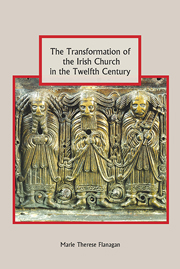Book contents
- Frontmatter
- Contents
- Acknowledgements
- Abbreviations and short titles
- Introduction
- 1 Charting change in the twelfth-century Irish church: the problem of sources
- Bishops and dioceses
- Varieties of monasticism
- Lay society
- 5 ‘Rules and good conduct’: the re-formation of lay society
- 6 ‘Right faith and good actions’: lay piety and devotion
- Conclusion: Universal ideals and regional responses
- Bibliography
- Index
5 - ‘Rules and good conduct’: the re-formation of lay society
from Lay society
Published online by Cambridge University Press: 05 October 2013
- Frontmatter
- Contents
- Acknowledgements
- Abbreviations and short titles
- Introduction
- 1 Charting change in the twelfth-century Irish church: the problem of sources
- Bishops and dioceses
- Varieties of monasticism
- Lay society
- 5 ‘Rules and good conduct’: the re-formation of lay society
- 6 ‘Right faith and good actions’: lay piety and devotion
- Conclusion: Universal ideals and regional responses
- Bibliography
- Index
Summary
Few questions are more essential, yet more difficult to answer, than the impact that reformist ideology may have had on lay society. It is well-nigh impossible to penetrate the religious aspirations, beliefs and responses to clerical teaching of lay people in twelfth-century Ireland since most were illiterate. The very term laity obscures the fact that there may have been a wide spectrum of different viewpoints among the varied social gradations. It is equally difficult to discern the points of contact and the differences between lay and clerical attitudes. Educated clergy might issue instructions: how the teachings of the church and its prescriptions for the laity were received is less clear. Even among clergy there may have been substantial differences between the educated – some abroad, or with experience of Continental travel – the half-educated or the outright ignorant. At the most learned end of the spectrum were individuals like Flann (Florint) Ua Gormáin, who died in 1174 as chief scholar of the church of Armagh, having previously spent twenty-one years studying among the Franks and the English and a further twenty-one years ‘directing the schools of Ireland’. The Annals of Tigernach described him as ardmaighistir (‘chief master’). That title, derived from Latin magister, rather than the more ubiquitous fer léigind (‘man of [ecclesiastical] reading’), is suggestive of an education in a Continental cathedral school or embryonic university and mastery of a useful discipline. Laity and clergy are thus convenient labels that obscure gradations and differences within and between the two groups; and, in addition, it is not possible to penetrate the minds of those who were alienated: the anti-clerical, dissenters or heretics.
- Type
- Chapter
- Information
- The Transformation of the Irish Church in the Twelfth Century , pp. 169 - 202Publisher: Boydell & BrewerPrint publication year: 2010



